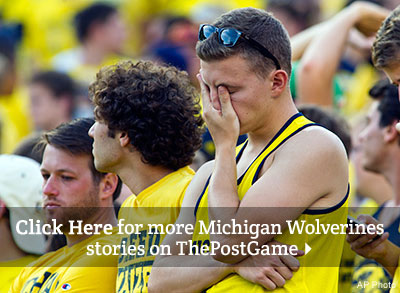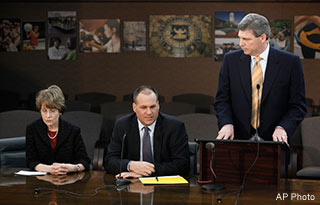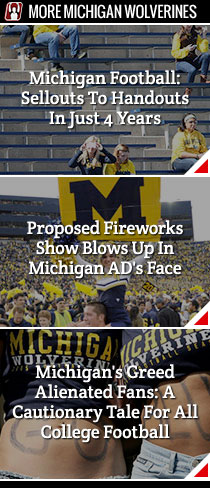Michigan's football team traveled to Michigan State this weekend to renew their century-old sibling rivalry. It was a big game for both teams -- but for very different reasons.
Eighth-ranked Michigan State was favored to beat the struggling Wolverines by more than two touchdowns -- and they easily covered, thrashing their foes, 35-11. The Spartans' victory marked their sixth win over the Wolverines in their past seven tries, establishing unquestioned dominance over the state for the first time since LBJ ruled the White House. It also alters the dialogue between the two schools. After all, calling your little brother "Little Brother" gets a bit awkward when he keeps kicking your butt. The win also preserved the Spartans’ shot at a national title -- and the Big Ten’s best chance.
Michigan's dreams were more modest, but more urgent. Going into the contest, the Wolverines had lost ten of their past 15 games. The game has changed a lot the past few decades, but blocking hasn’t, and the Wolverines aren't very good at it. They look poorly coached -- especially when the coaches put only ten players on the field. They’ve done that three times this season -- probably more than your local high school team will do all season.
But, to the players' credit, instead of giving up on their coaches and each other, they’ve played their hearts out the last three games. If they had somehow managed to upset the Spartans on Saturday, it would have gone a long way toward saving head coach Brady Hoke's job.
But they didn't, of course, so the 3-5 Wolverines could be searching for a new coach for the third time in seven years. But who will do the searching?
In 2010, when Michigan named Dave Brandon to become its 11th athletic director in 112 years, he was presented as "an ideal candidate for athletic director," by then U-M President Mary Sue Coleman. "I am confident that he will carry on the tradition of excellence in U-M athletics as we enter a new era."
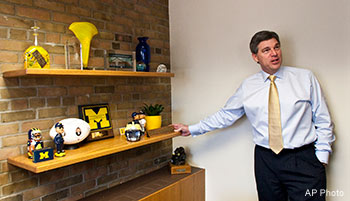
True, he had never worked in an athletic department before, but Michigan's four previous athletic directors hadn't either, and Brandon seemed to have everything else going for him. He had played for Bo Schembechler, led two Fortune 500 companies, and served an eight-year term as a Republican member of Michigan's Board of Regents. There, he earned a reputation for playing well with others, including the Democrats on the board.
"If there was one thing Brandon could handle," I wrote in 2011, "it was public relations. And if there was one thing Michigan and its beleaguered coach [Rich Rodriguez] needed, that was it."
Brandon quickly earned accolades for his masterful management of an ongoing NCAA investigation, his spot-on press conferences and his many speeches to the Michigan faithful.
In late 2012, Brandon announced a master plan to renovate ten facilities and build seven new ones. This included a field hockey project for $10 million, new lacrosse facilities for $12 million, a pool expansion for $20 million, a new rowing/strength and conditioning center for $25 million, a new multipurpose gym for $30 million, and a new track facility for $90 million -- plus "The Walk of Champions," which will create "one complete, contiguous athletic experience that will be as impressive in its scale as it is in its vision."
The department estimated the entire master plan would cost $250 million in 2012, but more recently, the department bumped its estimate to $340 million.
If Brandon isn't afraid to spend money, he has redoubled efforts to raise it, too. He started by tripling the department's development staff, from nine to twenty-eight full-time fund-raisers, to help cover the department's operating budget, which has grown from $100 million during the 2010–11 fiscal year to $137.5 million just three years later. (The operating budget does not include the capital expenditures listed above.)
As I wrote in Fourth and Long: "If the Michigan athletic department had issued a 2012 annual report to its shareholders, it would have been the shiniest publication in college sports, packed with enough good news to make the competition envious. By those measures, its creator could be considered an all-American athletic director."
But, I continued, the message behind Brandon’s means should have raised more eyebrows. In his many speeches, he promised he would replace 100 of the department’s 261 employees. His word proved good, and then some. Four years later, more than half the department’s staff has been replaced, over 150, and 86 positions added, for a total of 347 staffers. (In fairness, 32 of those new staffers work directly with or for student-athletes, but that leaves 54 added for marketing and other business positions.)

Many of those who left had devoted their lives to the school, or disagreed with their new boss, or both. Many of the new employees had no ties to Michigan before being hired.
In those same speeches, he often mentioned his first hire would be a chief marketing officer, which reflected one of his principal missions. He changed the title of the director of human resource to "Chief Talent Officer" and had her report directly to him.
Although Michigan had attracted more than 100,000 fans for 223 consecutive games when Brandon took over, he often told his staff, "If it ain't broke, break it!" quoting the title of a popular business book from 1992.
He and his staff did so by adding more fly-overs, rock music, and promotions to game days, intending to create a "'Wow!' experience." They started selling bottles of water for five dollars, cups of hot chocolate for ten, and each seat for an average of $100 more than his predecessor had.
Brandon is a tireless worker who often responds to fans in the wee hours of the morning, but it's not clear if his prolific emailing always helps. To one long time season-ticket holder and donor, who raised a calm concern about the department's $2.8 million electronic billboard outside the football stadium, Brandon closed his note by saying:
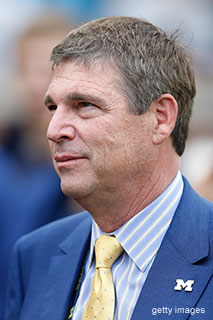
"If the idea of highlighting the accomplishments and activities of our teams and student-athletes is really objectionable to you....I would suggest you simply avoid driving along Stadium Boulevard and you will never see the video board!"
Another longtime donor, Pete Nichols, met with Brandon in his office in 2012. In a letter to President Schlissel this fall, Nichols recalled that Brandon was incredulous the students were mad at him for raising their football ticket prices from $28 a game in 2011 to $32 a game in 2012. When Nichols replied, "Well, yes, I can believe it. Like the rest of us they also see the price of a hot dog and a Coke escalating to an unreasonable point."
After a little back-and-forth, Nichols recalls Brandon saying, "C'mon, Pete. After all, it's mommy and daddy's money!"
Nichols proved prescient. Many fans grew disenchanted with the team's slide into mediocrity, the anemic home schedules, and the cost of it all -- including the decision to raise student ticket prices again in 2013 to a league high $295, or $42 a game. The price stayed there for 2014, but by this fall, the season-ticket wait list had evaporated, the stadium failed to sell out for the first time in decades, and the student section was roughly half what it was before Brandon took over.
Matters came to a head this season, when the Michigan football team capped its first fall in 135 years with three losses before October. During the 30-14 drubbing at the hands of the Minnesota Golden Gophers, Michigan's PA announcer claimed the attendance was 102,926, which would be enough to maintain Michigan's 39-year streak of 100,000-plus crowds. The crowd booed its disbelief, then chanted for the athletic director to be fired.
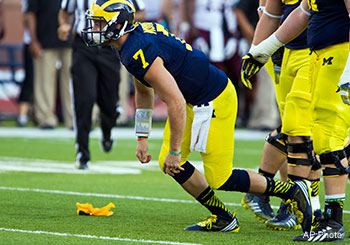
And then things took a turn for the worse.
The lasting image of the day is not of the empty end-zone seats or the Gophers triumphantly hoisting the Brown Jug over their heads, but of Michigan quarterback Shane Morris getting knocked flat on his back by a vicious helmet-to-helmet hit -- then getting up, and wobbling like he was suddenly too drunk to stand on his own. He stayed in for the next play, then returned a few plays later, which drew the announcer's contempt and launched a national story.
Meanwhile, Michigan had little to say about the situation, sending out Hoke to his Monday press conference to tell reporters Morris hadn't suffered a concussion, and he hadn't spoken to his boss. At 1 a.m. Tuesday, however, Brandon sent out a press release stating Morris had suffered a "probable mild concussion," and that Brandon had been in constant communication with his head coach and everyone else involved. That included the team's medical staff, whom Brandon indirectly blamed for the mess in his subsequent interviews. As you can imagine, Michigan's highly qualified medical team was not terribly pleased.
Michigan's legendary athletic director, the late Don Canham, told me the key to public relations was never turning a one-day story into a two-day story. The current administration managed to stretch out the Shane Morris situation to a solid week, to no one's satisfaction.

The students made their discontent plain -- not with the team or the coaching staff, but the athletic director -- by starting a petition to get him fired, launching a campus rally for the same purpose, and repeating their chant at football and hockey games: "Fi-re Bran-don!"
In case there was any doubt where Michigan's students stood, last week's Regents meeting cleared that up, too, when two student leaders presented their case against the athletic director, including the results of a student survey that indicated the athletic director was their chief complaint. Central Student Government president Bobby Dishell concluded, "The athletic department has broken its trust with the student body."
UM public policy graduate student and alumnus Zeid El-Kilani added, "We are nauseated by the doublespeak, public relations gaffes and contempt that many see in the athletic department. It is clear that change is necessary. That is why I and 11,000 other students and alumni respectfully request the university relieve Mr. Brandon of his duties as athletic director."
The alumni and fans don't seem any happier, and many football lettermen want their former teammate fired. More than one hundred have signed a petition for the athletic department to appoint a full-time liaison to the lettermen, create a place for them to gather during games, and provide tickets at face value near the tunnel, since many can't walk as well as they used to.
Brandon seems to have lost most of Michigan's old guard, too, and now they're speaking up. This includes the widow and long time assistant of Don Canham, Michigan's athletic director from 1968 to 1988, who started the attendance streak.
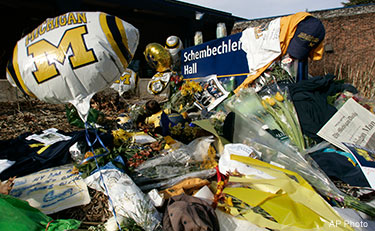
"Don and Bo [Schembechler] built this up for decades, and now it's going down the tubes in just a few years," Margaret Canham-Keeley told me. "It's sad to see it come to this. If Dave [Brandon] is trying to cater to the students with Beyonce and Eminem, it's not working. The ‘Wow factor' seems to boil down to fireworks, flyovers and empty seats."
Who might save Brandon? Many of the student-athletes say they like Brandon because he comes to their practices and has promised fabulous new facilities for all sports, including lesser-known programs like lacrosse and crew.
Just a few weeks ago, it seemed like big donors might be among Brandon's strongest supporters. "He's probably the most qualified athletic director in the country," real estate developer and UM alumnus Stephen Ross told Bill Shea of Crain's Detroit Business. Forbes estimates Ross to be worth about $6 billion. "I think he's terrific. You don't go around giving $100 million if you don't feel there is going to be bang for the buck."
But if such high-rollers could save athletic directors, it would raise a fair question: Who runs the university -- deans or donors?
The question became moot after President Schlissel held a private meeting two weeks ago with many of Michigan's biggest donors, who expressed their displeasure with the athletic director. Ross himself announced to the group that President Schlissel had his blessings to do whatever he needed to do.
With that, Brandon lost another potentially potent power base.
But the fans don't get to vote on Brandon's fate. Nor do the donors, deans or even the Regents. Only one person gets to make that decision: Michigan's newly minted president, Mark Schlissel, who earned both a Ph.D. and an M.D. before becoming the provost at Brown University. The scouting report I've gotten on him is consistent: he is brilliant, he is honest, and he "gets it." Michigan could surely do worse.
But if there's one problem President Schlissel would rather not deal with in his first year, this is it.
If he decides to fire Brandon, he'll have to negotiate Brandon's exit -- and his $3 million buy-out, thanks to the contract extension Brandon signed in 2012 -- then form a search committee, select a new A.D., and oversee the hiring of a new football coach. All these things consume time and energy, which Schlissel would prefer spending on the university's real missions: teaching and research.
But doing nothing might be worse, resulting in lame duck coaches, falling ticket sales, dwindling donations and slipping school spirit, not to mention growing deficits, distractions and dissension.
With two years left on Hoke's six-year contract, he and his staff will have a hard time recruiting the best prospects, or even keeping the commitments they have, unless Michigan gives him and his staff long extensions – something few are eager to see. With optimism at a low ebb, season ticket sales could continue to fall for 2015, led by a growing student revolt.
All they need is to be pushed.
The department will probably need to slash prices, creating a significant decline in the revenue they need to pay for Brandon's burgeoning budget. Athletic department officials don't need to wait to see disappointing season ticket sales to know they're in trouble. The rainy day is fast approaching, and they are already preparing for it by looking for budget cuts.
After the Shane Morris story blew up, Brandon also began courting the very students he had previously ignored, and went on a media tour to "let people get to know me better." On Thursday, Michigan announced it would cut student ticket prices from $295 this season to $175 -- a very good step. Only Brandon knows if his overtures have been inspired by a sincere desire to mend fences, or an equally sincere desire to avoid being fired.
But Michigan's problems run deeper than that. In 2010, Michigan opened 81 skyboxes, costing from $55,000 to $85,000, plus whatever donations you needed to get the best suites. Michigan has a half-dozen empty suites this season, and could end up with a lot more when a third of them come up for renewal this off-season. The timing couldn't be worse, and could cost the department a good chunk of the $15 million or so the skyboxes bring in every year, and the $5 million in additional gifts.
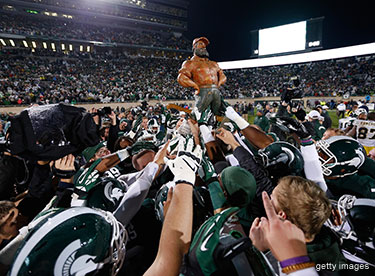
If Brandon's reputation for marketing savvy has taken a hit, his equally lofty status as a financial wizard could crumble next.
Department revenues have grown significantly during Brandon's tenure, about 7 percent a year, to almost $150 million. This is partly due to the dramatic increase in conference TV payouts to Big Ten members, which have more than doubled during Brandon's tenure to $44.5 million for each school. But his operating expenses have grown even faster than revenues, at nearly 9 percent a year, to total $145 million. That figure does not include any of the capital expenses budgeted for buildings, but it does include administrative salaries, which have grown by 72 percent.
As a result, the department's operating margin has declined steadily since Brandon took over, falling from the 15-20-percent annual operating surpluses routinely generated by Brandon's predecessor, to a mere 3.4 percent today. It doesn't take a genius to realize a dip in revenues next season could put Michigan's annual operating budget in the red.
When I reviewed these figures with a financial analyst, he said, "If Michigan football was a stock on Wall Street, it would get creamed, and the CEO would get hammered."
It’s worth remembering: All these scenarios assumed Hoke’s team would beat Michigan State, and a few more teams, en route to another Buffalo Wild Wings Bowl. Now that Michigan stands at 3-5, without many signs of life, even that low bar might not be reached -- and even more problems could multiply.
After the Spartans embarrassed the Wolverines, as expected, Michigan will likely be pushed to conduct another coaching search. Since the best candidate Brandon was willing or able to get four years ago was Brady Hoke, a man with a career 47-50 record and no league titles, should anyone expect Brandon to do better this time around?
It is extremely unlikely that any of Michigan's prodigal sons -- Les Miles, Jim or John Harbaugh -- will be willing to work for Dave Brandon, who's been known to watch game film with Hoke's staff. In fact, it's unlikely that any top candidate would be willing to sign with any athletic director whose job security is an open question. Thus, even if Michigan fails to make a bowl game, Hoke might get another season if Brandon is still the athletic director.
The danger of waiting to make changes is not simply that Michigan could suffer through another disappointing season, on and off the field, but that it could lose a group of fans forever. The Michigan fan's habit has taken decades to develop, but it can be broken in a weekend. With more fans discovering the joys of staying at home, and not getting gouged on parking, ticket prices, seat licenses, hot dogs and water, and instead enjoying a comfortable couch, better food, and no line for cleaner rest rooms, it's fair to wonder how many of them will come back to the Big House after a year or two at home.
Even considering the worst case scenario, Michigan football stays in the doldrums through another season, ticket sales plummet, and fans continue to call for Brandon's head, Michigan will still be a premier public university. You could even argue a few down years would help reinforce the proper priorities of the university, placing academics ahead of athletics.
But I wouldn't want to be the president during that stretch.
President Schlissel's dilemma could deepen after the November 4 election.
One of the wonderful things about college football is that it transcends politics. But not now, apparently, at least in Ann Arbor. The University of Michigan is governed by an eight-person Board of Regents, two of whom are elected to office every two years, to eight-year terms. Unlike those of most universities, Michigan's trustees are openly partisan. You have to win your party's nomination before reaching the fall ballot.
Michigan's board is currently composed of six Democrats, who want Brandon out, and two Republicans, who want him to stay.
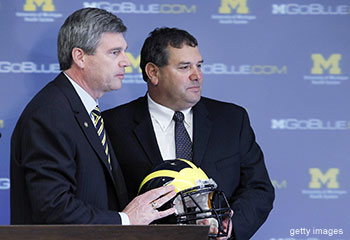
After the students spoke at last week's Regent meeting, one Democrat, Mark Bernstein, said, "The Shane Morris incident, the poor performance of the football team, is like a spark in a very, very dry forest, and there's not a lot of water around right now."
But three-term Republican Andrea Fischer Newman argued, "You've got to look at the whole athletic department. You've got to look at the addition of sports, you've got to look at the addition of facilities. You've got to look at what we've done with women's sports. You've got to look at the money that's been raised, you've got to look at the budget. There's a lot of good things being done on campus right now in athletics."
If two Republicans win in November, when the new board convenes in January, it could be split, 4-4, on Brandon's fate. If President Schlissel does not act before then, the Democrats will be upset. If he tries to act after the election, but before January, the Republicans will howl.
Only one thing is certain: if that happens, Schlissel will pine for the problems he has today.
The most important issue at stake is not wins and losses, ticket prices or revenues, but the timeless values upon which the University of Michigan was built: Cooperation and compromise, transparency and truthfulness. The department has been notably lacking in all four.
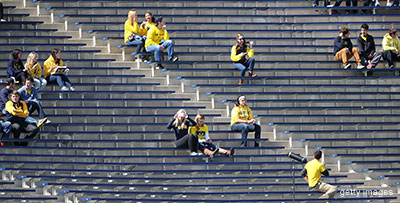
After each error in judgment, usually born of arrogance, the department first denies, then dissembles, then invariably blames the "misunderstanding" on someone else's "miscommunication." The list includes PR fiascos over seat cushions, a giant Kraft macaroni noodle under the scoreboard, skywriting "GO BLUE" over Michigan State's stadium, and killing a promotion to give away two tickets to the Minnesota game for the purchase of two Cokes, plus the Shane Morris situation.
Each time the department trips over itself, it sounds less like a part of a world-class university, and more like the troubled subsidiary of an embattled corporation.
It's this tension between what the university stands for, and how the current athletic department acts, that will persist until someone deals with it directly.
And that someone can only be President Schlissel.
-- John U. Bacon is the author, most recently, of Fourth and Long: The Fight for the Soul of College Football, a New York Times bestseller. He gives weekly commentary on Michigan Radio, teaches at the University of Michigan and Northwestern's Medill School of Journalism, and speaks nationwide on leadership and diversity. Learn more at JohnUBacon.com, and follow him on Twitter @johnubacon.

